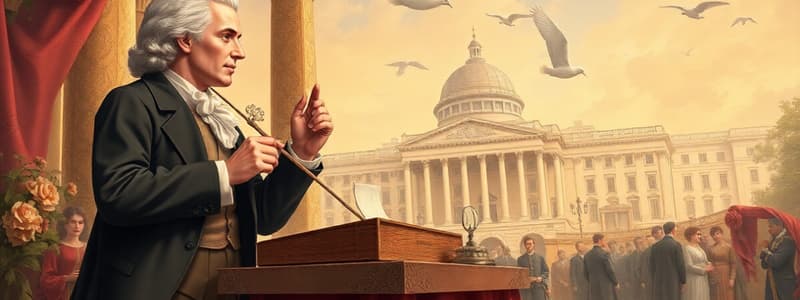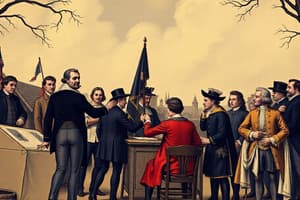Podcast
Questions and Answers
What specific constitutional flaw led to the tie between Jefferson and Burr in the 1800 election?
What specific constitutional flaw led to the tie between Jefferson and Burr in the 1800 election?
The Constitution at the time did not differentiate between votes for President and Vice President on ballots.
What were the Alien and Sedition Acts, and why did the Democratic-Republicans object to them?
What were the Alien and Sedition Acts, and why did the Democratic-Republicans object to them?
The Alien and Sedition Acts were laws that restricted immigration and freedom of speech. Democratic-Republicans opposed them because they believed the acts infringed on individual rights.
Explain how Hamilton's actions impacted the outcome of the 1800 election, despite being a Federalist.
Explain how Hamilton's actions impacted the outcome of the 1800 election, despite being a Federalist.
Despite being a Federalist, Hamilton disliked both Jefferson and Burr but viewed Jefferson as the lesser of two evils. He used his influence to sway Federalist votes in the House of Representatives, ultimately helping Jefferson win the presidency.
How did the Democratic-Republicans broaden their coalition compared to the Anti-Federalists during the ratification debates?
How did the Democratic-Republicans broaden their coalition compared to the Anti-Federalists during the ratification debates?
What was the main difference in philosophy between the Federalists and the Democratic-Republicans regarding the power of the federal government?
What was the main difference in philosophy between the Federalists and the Democratic-Republicans regarding the power of the federal government?
Why was the election of 1800 considered a 'revolution'?
Why was the election of 1800 considered a 'revolution'?
Describe the Democratic-Republican stance in 1800 regarding the size and funding of the military.
Describe the Democratic-Republican stance in 1800 regarding the size and funding of the military.
How did Jefferson attempt to unify the country after the divisive election of 1800?
How did Jefferson attempt to unify the country after the divisive election of 1800?
Explain how western expansion influenced the outcome of the election.
Explain how western expansion influenced the outcome of the election.
How did the Federalist party attack Jefferson's character and beliefs during the election?
How did the Federalist party attack Jefferson's character and beliefs during the election?
What role did James Madison play in the election of 1800, and how did this differ from his earlier political activities?
What role did James Madison play in the election of 1800, and how did this differ from his earlier political activities?
Describe how the outcome of the election impacted the makeup of the House of Representatives.
Describe how the outcome of the election impacted the makeup of the House of Representatives.
Why were the Alien and Sedition Acts considered controversial, and what did they aim to do?
Why were the Alien and Sedition Acts considered controversial, and what did they aim to do?
What factors contributed to the shift in support from urban workers and artisans away from the Federalists and towards the Democratic-Republicans?
What factors contributed to the shift in support from urban workers and artisans away from the Federalists and towards the Democratic-Republicans?
Beyond the presidential outcome, what other significant shift in political power occurred as a result of the 1800 election?
Beyond the presidential outcome, what other significant shift in political power occurred as a result of the 1800 election?
Flashcards
Election of 1800
Election of 1800
An emotional and hard-fought campaign between John Adams and Thomas Jefferson where each side believed that victory by the other would ruin the nation.
Federalist attack on Jefferson
Federalist attack on Jefferson
Accusation against Jefferson by Federalists, alleging he was an un-Christian deist influenced by the French Revolution.
Republican objections to Adams
Republican objections to Adams
The Democratic-Republicans criticized the federal power under Adams, especially the expansion of the military and the Alien and Sedition Acts.
Core Ideological Divide
Core Ideological Divide
Signup and view all the flashcards
Electoral College Tie
Electoral College Tie
Signup and view all the flashcards
Federalists cast for Thomas Jefferson
Federalists cast for Thomas Jefferson
Signup and view all the flashcards
Hamilton's Role in Jefferson's Victory
Hamilton's Role in Jefferson's Victory
Signup and view all the flashcards
Core Group Divisions
Core Group Divisions
Signup and view all the flashcards
Expanded Republican Coalition
Expanded Republican Coalition
Signup and view all the flashcards
Democratic-Republican Beliefs
Democratic-Republican Beliefs
Signup and view all the flashcards
Significance of the Election of 1800
Significance of the Election of 1800
Signup and view all the flashcards
Jefferson's Inaugural Address
Jefferson's Inaugural Address
Signup and view all the flashcards
Study Notes
- The election of 1800 was a fiercely contested and highly emotional campaign between John Adams and Thomas Jefferson.
- Both sides were convinced that a victory by the other would have devastating consequences for the nation.
- Federalists portrayed Jefferson as an un-Christian deist whose support for the French Revolution threatened to bring chaos and bloodshed to the U.S.
- Democratic-Republicans criticized the excessive centralization of federal power under Adams, particularly the expansion of the military, the Alien and Sedition Acts' infringement on individual rights, and the new taxes and deficit spending.
- Federalists favored a strong federal government to control the excesses of popular majorities.
- Democratic-Republicans sought to reduce national authority so that citizens could have greater control through state governments.
- The Democratic-Republicans achieved a decisive victory, gaining control of both houses of Congress, with a substantial majority in the House of Representatives.
- Jefferson and Aaron Burr, the Republican candidates for president and vice president, received an equal number of electoral votes due to an outdated constitutional provision.
- The election was decided in the House of Representatives, where each state had one vote.
- Federalists in Congress, still in power, had to make the decision between Jefferson and Burr.
- Alexander Hamilton played a crucial role in securing the presidency for Jefferson, whom he considered the lesser of two evils.
- Ultimately, Jefferson won with ten state delegations voting for him, compared to four for Burr, and two abstaining.
- The core supporters of each side were similar to those during the ratification debates of 1788-1789, with merchants and manufacturers as Federalists and states' rights advocates as Republicans.
- Thomas Jefferson's victory in the 1800 presidential election was secured by support from the Western frontier.
- Urban workers and artisans, who had previously supported the Constitution and Adams, shifted their allegiance to the Jeffersonians.
- James Madison, a key figure in shaping the Constitution, became a leading party organizer for the Republicans.
- The Democratic-Republicans advocated for a government accountable to the people, and their coalition and ideals would dominate American politics for much of the 19th century.
- The election of 1800 was the first peaceful transfer of political power between opposing parties in U.S. history, marking a significant moment.
- Jefferson called for unity in his inaugural address, stating, "We are all Republicans, we are all Federalists."
Studying That Suits You
Use AI to generate personalized quizzes and flashcards to suit your learning preferences.




